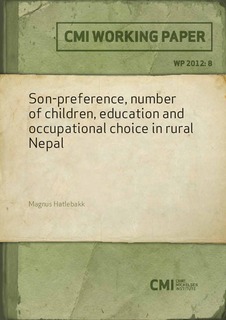| dc.contributor.author | Hatlebakk, Magnus | |
| dc.date.accessioned | 2018-01-04T08:23:07Z | |
| dc.date.available | 2018-01-04T08:23:07Z | |
| dc.date.issued | 2012-10-01 | |
| dc.identifier | oai:www.cmi.no:4580 | |
| dc.identifier.citation | Bergen: Chr. Michelsen Institute (CMI Working Paper WP 2012:8) 26 p. | |
| dc.identifier.isbn | 978-82-8062-446-8 | |
| dc.identifier.issn | 0804-3639 | |
| dc.identifier.uri | http://hdl.handle.net/11250/2475384 | |
| dc.description.abstract | A unique family survey was conducted in Nepal to investigate the economic consequences of having a first-born girl. Women get more children, but we find no causal effect of number of children on economic outcomes. But independently of the number of children there is a positive effect on boys' education of having a first born sister, who presumably takes care of household work so the boys can focus on school. This indicates a stronger son-preference in Nepal than what is found in studies from neighboring countries. | |
| dc.language.iso | eng | |
| dc.publisher | Chr. Michelsen Institute | |
| dc.relation | CMI Working Paper | |
| dc.relation | WP 2012:8 | |
| dc.relation.ispartof | CMI Working Paper | |
| dc.relation.ispartofseries | CMI Working Paper WP 2012:8 | |
| dc.relation.uri | https://www.cmi.no/publications/4580-son-preference-number-of-children | |
| dc.subject | Fertility | |
| dc.subject | Intra-Household Gender | |
| dc.subject | Nepal | |
| dc.title | Son preference, number of children, education and occupational choice in rural Nepal | |
| dc.type | Working paper | |
| dc.identifier.cristin | 1143355 | |
